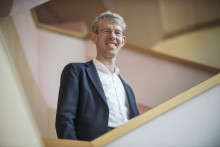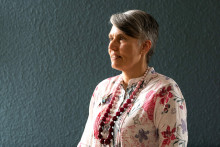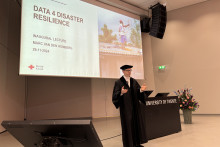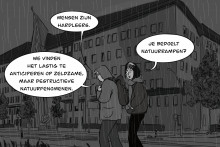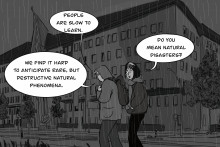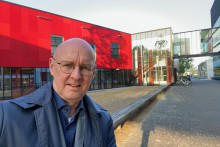Maarten van Aalst was appointed for the Prinses Margriet Research Chair, which was established last year by the UT and the Red Cross. Its goal is to strengthen scientific knowledge of natural disasters and climate change for disaster prevention - a topic that Van Aalst had already been working with very closely. Not as an academic, but as the director of the Red Cross Crescent Climate Centre, a position he is combining with his new job at ITC.
‘This chair is ideal for me, because I was already familiar with Prinses Magriet’s heritage in Red Cross,’ says Van Aalst. ‘It already drove my work, which was always at an interface with science. The demand for our support as the Red Cross Crescent Climate Centre has grown tremendously; and to provide good support the knowledge component is critical. Which is why a strong link to academia is very important.’
‘I want to produce academic knowledge that can prevent extremes from becoming disasters’
‘My job comes with a lot of responsibility to be an ambassador. I need to tell people of what we do know and convince them to act on it, because the impacts of climate change will keep increasing,’ says Van Aalst. His research at the UT will be in line with this sense of responsibility. ‘I want to produce academic knowledge that can prevent extremes from becoming disasters,’ he says. ‘That sounds very broad, but I will zoom in over time.’
Early warning, early action
Through his future work, Van Aalst would like to increase our resilience to disasters through so called ‘early warning, early action systems’. ‘This refers to anticipating shocks and acting ahead of time,’ he explains. ‘I’d like to gather evidence to show how much it’s worth it to act beforehand. One example of many: Bangladesh is often affected by cyclones. There are early warning systems in place, and so people can be evacuated, but that is not where it ends. Local farmers often lose their cattle during the resulting floods, they lose their livelihood. They then need international financial support to survive. But what if we acted beforehand and gave them a little bit of money, so that they could move their cows into safety?’
The professor refers to such measures as ‘anticipatory social protection’. ‘We already have social protection systems in place. There is health insurance, unemployment benefits and so on. I’d like to see if we can make these systems smarter. They usually target poverty, but anticipatory protection could target people before they reach the poverty line.’

‘A bridge between science, policy and practice’
Although no specific projects have been set up yet, Van Aalst already knows that he wants his research at ITC to be fueled by his work at the Red Cross. ‘I’m looking for the knowledge that would make the biggest difference. At my position I serve as a bridge between science, policy and practice.’ Which was also the reason why he decided to dive into academia. ‘I saw ITC as an institute that is in touch with the real world.’
The new professor is still settling in at ITC, having been at the position only since last month. ‘As you can see from my empty office,’ he says, pointing to the bare white walls. ‘It is hard to bring stuff on train from Utrecht, where I live. And this is actually only my sixth day physically at the faculty. I do already feel at home, though. There are so many interesting people and research ideas here. I’m filling my days with meetings and looking for links to the research line I’d like to establish.’
Professor Maarten van Aalst
2019 Professor for ‘Spatial resilience for Disasters Risk Reduction’ at the Faculty of Geo-Information Science and Earth Observation (ITC) of the University of Twente
2005 – now Director of the Red Cross Red Crescent Climate Centre
1999 – 2011 Climate Risk Management Specialist at the World Bank
2004 PhD in Climate Research at Universiteit Utrecht and Max Planck Institute for Chemistry (Germany)
1998 MSc in Astrophysics at Utrecht University
The next generation
He believes that the Prinses Margriet Research Chair can help with all his goals and ideas. ‘I need to juggle time, but there is a lot of synergy between my work at the Red Cross and at the university,’ says Van Aalst. ‘I see a lot of potential to make more of the knowledge at ITC and the UT in general. I’d like to strengthen the impact of the great work done here.’
What else motivates him on his new academic path? ‘I’m naturally curious and like learning. And I like the people. I really enjoy the process of supervising. I hope I can contribute to the next generation of talented – and well-trained – researchers. In five years’ time I want to be able to look back at my work at ITC and see it has made a real difference in real places.’
'The next five years will be crucial'
A big part of Maarten van Aalst’s work is informing people about the climate change and the risks that come with it. Is he optimistic about the future? ‘I’m optimistic, but not complacent. The next five years will be crucial. We need to make really rapid progress. The current climate strikes make me optimistic, I see that the young generation is interested in the topic, but we need to make changes very fast. It will be a tough couple of years.’


